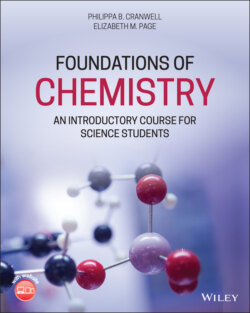Читать книгу Foundations of Chemistry - Philippa B. Cranwell - Страница 2
Table of Contents
Оглавление1 Cover
2 Title Page
3 Copyright Page
4 Dedication Page
5 Preface
6 Acknowledgements
7 Contributors
8 About the companion website
9 0 Fundamentals 0.1 Introduction to chemistry 0.2 Measurement in chemistry and science – SI units 0.3 Expressing large and small numbers using scientific notation 0.4 Using metric prefixes 0.5 Significant figures 0.6 Calculations using scientific notation 0.7 Writing chemical formulae and equations Quick‐check summary End‐of‐chapter questions
10 1 Atomic structure 1.1 Atomic structure 1.2 Electronic structure Quick‐check summary End‐of‐chapter questions
11 2 Chemical bonding 2.1 Bonding 2.2 Valence Shell Electron Pair Repulsion Theory (VSEPR) 2.3 Polar bonds and polar molecules 2.4 Intermolecular forces Quick‐check summary End‐of‐chapter questions
12 3 Amount of Substance 3.1 Masses of atoms and molecules 3.2 Amount of substance 3.3 Calculations with moles 3.4 Solutions; concentrations and dilutions 3.5 Titration calculations 3.6 Calculations with gas volumes Quick‐check summary End‐of‐chapter questions
13 4 States of matter 4.1 Introduction 4.2 Solids 4.3 Liquids 4.4 Gases Quick‐check summary End‐of‐chapter questions
14 5 Oxidation‐reduction (redox) reactions 5.1 Redox reactions 5.2 Disproportionation reactions 5.3 Redox titrations Quick‐check summary End‐of‐chapter questions
15 6 Energy, enthalpy, and entropy 6.1 Enthalpy changes 6.2 Entropy and Gibbs free energy Quick‐check summary End‐of‐chapter questions
16 7 Chemical equilibrium and acid‐base equilibrium 7.1 Introduction 7.2 Equilibrium and reversible reactions 7.3 Acid‐base equilibria Quick‐check summary End‐of‐chapter questions
17 8 Chemical kinetics – the rates of chemical reactions 8.1 Introduction 8.2 The rate of reaction 8.3 Determining the rate of a chemical reaction 8.4 The rate expression 8.5 The half‐life of a reaction 8.6 Reaction mechanisms 8.7 Effect of temperature on reaction rate Quick‐check summary End‐of‐chapter questions
18 9 Electrochemistry 9.1 Introduction 9.2 Using redox reactions 9.3 Using redox reactions – galvanic cells 9.4 Using redox reactions – electrolytic cells Quick‐check summary End‐of‐chapter questions
19 10 Group trends and periodicity 10.1 The periodic table: periods, groups, and periodicity 10.2 Trends in properties of elements in the same vertical group of the periodic table 10.3 Trends in properties of elements in the same horizontal period Quick‐check summary End‐of‐chapter questions
20 11 The periodic table – chemistry of Groups 1, 2, 7 (17), and transition elements 11.1 Introduction 11.2 Group 1 – the alkali metals 11.3 Group 2 – the alkaline earth metals 11.4 Group 7 (17) – the halogens 11.5 The transition elements Quick‐check summary End‐of‐chapter questions
21 12 Core concepts and ideas within organic chemistry 12.1 Types of molecular formulae 12.2 Nomenclature of simple alkanes 12.3 Isomers 12.4 Drawing reaction mechanisms 12.5 Types of reactions Quick‐check summary End‐of‐chapter questions
22 13 Alkanes, alkenes, and alkynes 13.1 Alkanes: an outline 13.2 Alkenes: an outline 13.3 Alkynes: an outline Quick‐check summary End‐of‐chapter questions
23 14 Reactivity of selected homologous series 14.1 Alcohols 14.2 Aldehydes and ketones 14.3 Carboxylic acids 14.4 Esters 14.5 Amides 14.6 Amines 14.7 Nitriles Quick‐check summary End‐of‐chapter questions
24 15 The chemistry of aromatic compounds 15.1 Benzene 15.2 Reactions of benzene with electrophiles 15.3 Aniline Quick‐check summary End‐of‐chapter questions
25 16 Substitution and elimination reactions 16.1 Substitution reactions 16.2 Elimination reactions 16.3 Comparison of substitution and elimination reactions Quick‐check summary End‐of‐chapter questions
26 17 Bringing it all together 17.1 Functional group interconversion 17.2 Bringing it all together Quick‐check summary End‐of‐chapter questions
27 18 Polymerisation 18.1 Polymerisation Quick‐check summary End‐of‐chapter questions
28 19 Spectroscopy 19.1 Mass spectrometry 19.2 Infrared spectroscopy (IR) 19.3 Nuclear magnetic resonance spectroscopy (NMR) 19.4 Bringing it all together Quick‐check summary End‐of‐chapter questions
29 Appendix
30 Short end-of-chapter answers
31 Index
32 End User License Agreement
